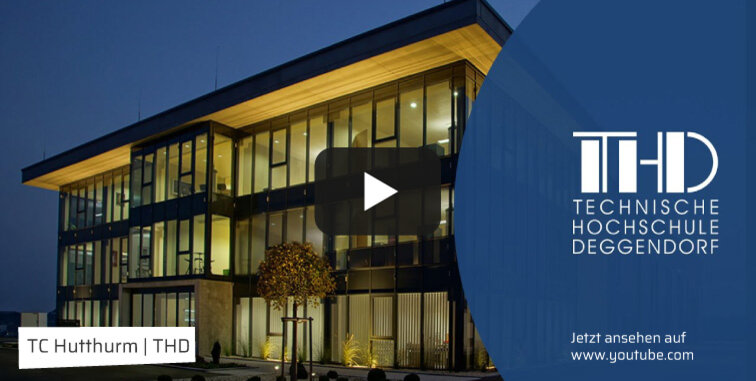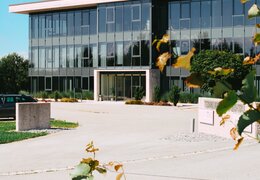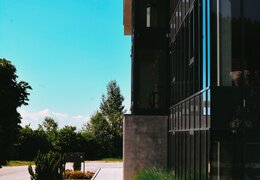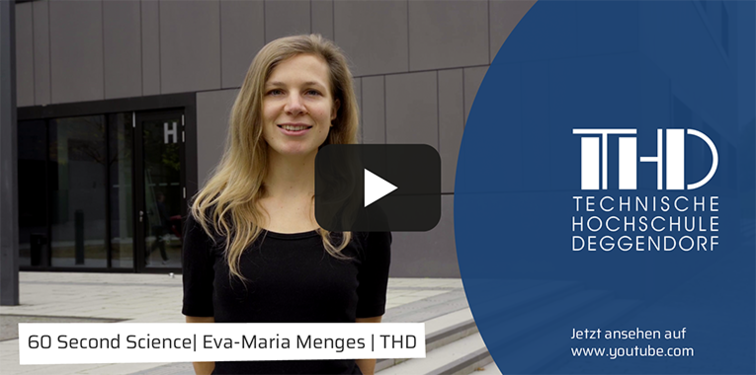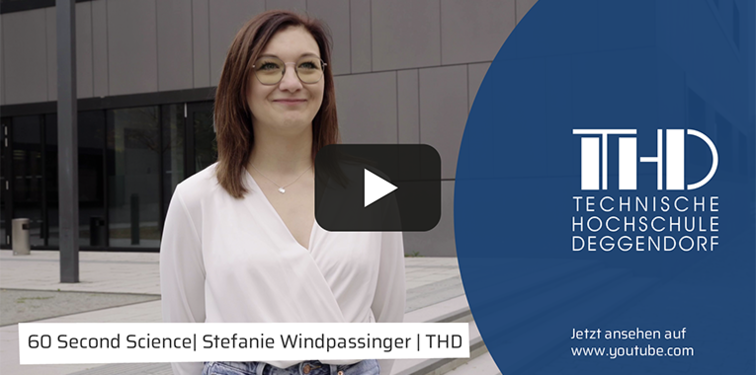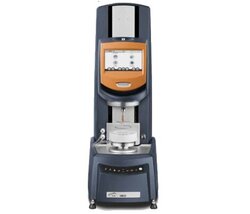research at dit
pioneering & vibrant
More robust, more efficient and more sustainable - that is our mission with the development, production and application of components in polymer and fibre composite technology. How can we support you on the way to innovative products?
about the campus hutthurm
We offer customised development solutions in four interdisciplinary fields of research.
Lightweight construction, materials research, process development and resource efficiency. We emphasise the importance of realising sustainability not through restrictions, but through innovative engineering concepts.
Our aim is to conserve resources by developing advanced technologies and utilising processes effectively. Together with the Polymer Campus Weißenburg, we form the Polymer Campus Bavaria.
Fields of Activity

We optimise components and enable the manufacture of lighter and stronger products with a longer service life.
- Structure Simulation
- Topology optimisation
- Composite manufacturing
We process plastic waste more efficiently and recycle it into high-quality, technologically sophisticated products.
- Recycling technology
- Biopolymer
- Life Cycle Assessment
We further develop industrial manufacturing processes in order to produce high-quality and more economical goods.
- Process-Simulation
- Material flow-Simulation
- Process-Monitoring (KI)
We analyse the material behaviour under various conditions and help to identify and use the perfect material.
- Material characterisation
- Material modelling
- Data acquisition and Data analysis
M.Sc. Eva-Maria Menges
Sustainability
M.Eng. Stefanie Windpassinger
3D Printing & Additive Manufacturing
Offer
Discover our wide range of solutions for quality assurance and process improvement:
- We optimise materials for prototypes and series production or look for suitable alternatives.
- We qualify a wide range of materials through strength analyses and verify service life and ageing resistance.
- Resilient and efficient components through structural and topology optimisation. Customised solutions for complex simulations using various software products.
- We support the implementation of recyclate utilisation quotas and evaluate the quality and material compositions for series production
- We help with the avoidance of n.i.O. -components through process analyses and calculate the necessary strengths.
- Our comprehensive thermal and mechanical material tests cover a wide range of materials. These include polymers, metals, adhesive bonds and wood.
projects
We bring applied research to companies. From the idea to industrial application.
Would you like to work with us on a publicly funded project to put your ideas into practice? Then we look forward to receiving your enquiry.
Your benefits:
- Secure funding for research projects (SMEs up to 80 %)
- Low administrative requirements from your side. We take over the process of coordinating application activities and organising ongoing projects
- Maximising economic efficiency - optimised manufacturing processes, improved material selection
- Carry out joint research work in a practical and scientifically based manner
- Open-topic research in the field of materials science and process analysis
- Prototypes are developed to market maturity in joint projects and the potential for business start-ups is explored.
We offer a wide range of services for solving material science problems.
We take individual requirements into account and rely on customised approaches that are supported by state-of-the-art testing technologies, simulations and AI.
- EXRE - Applied exoskeleton research for use in rehabilitation. The project aims to improve synergies between the regions in applied research. An international, interdisciplinary research team is driving the development of an exoskeleton prototype for rehabilitation and prosthetic practice.
Joint innovations in the fields of design, construction technologies, 3D printing, mechatronics, applied cybernetics (brain-computer interface) and rehabilitation will be utilised. The participation of 5 associated partners from the field and the testing of the exoskeleton enable a transfer of expertise to SMEs in the fields of mechatronics, rehabilitation and prosthetics.
Partner: University of West Bohemia: ZČU in Pilsen - SWEFTD - Development of an interdisciplinary approach to early tumour detection.
The aim of the project is to improve tumour detection through innovative data analysis. By combining the different approaches of medicine and engineering, a unique added value is created that opens up new perspectives.
The project also serves as a basis for future research projects and funding in the field of early tumour detection
Associated partners: University of Regensburg - Sim3dApp - Understanding materials and processes with automated reworking strategies using digital twins and simulation in FFF printing
The aim of the project is to develop an FFF printer that works primarily in the high-temperature range in order to process materials such as PEEK and fibre-reinforced polymers. With an integrated monitoring system consisting of various sensors, such as thermal cameras, the component history is recorded and defect monitoring is guaranteed. The real-time data generated is collected in a database and used for forecasting via AI algorithms. In the event of deviations, the system independently intervenes in the printing process and adjusts parameters accordingly or cancels the print. Simulations are used in parallel to supplement training data and make predictions even before the process starts.
Partner: Reimann Industrietechnik GmbH
- SensoTwin - Sensor-integrated digital twin for high-performance fibre composite applications
Partners: TC Freyung, TUM, TÜV Süd Industries Service GmbH, Enercon, Fos4x, UL International GmbH - HiPower - Industrial research and construction of a prototype for a novel 100W high power solar panel subsystem for New Space NanoSats and SmallSats
Partner: Deployables Cubed GmbH - AutoClean - Development of an automated post-processing line with integrated AI-based quality control and sorting station
and sorting station for components from powder bed-based 3D printing
Partners: TC Cham, SHL Automatisierungstechnik AG, thinkTEC3D GmbH - Smart3D - Smart 3D printing of high-performance polymer systems
Partners: TC Grafenau, Ingenieurbüro Muhr GmbH, Kumovis GmbH, nebumind GmbH - Powercube - Deployables Cubed GmbH - This project is about the development of a mini-satellite, which should deliver a power of 100W until the end of the mission. Furthermore, the structure is to be designed in such a way that it can be stowed in the volume of a cube with an edge length of 10 cm, can be transported safely, unfolds easily at the mission target and does not weigh more than two kilograms. In order to comply with the specified boundary conditions, the implementation of an integral fibre-reinforced carrier structure with innovative joints is being investigated. Deployment simulations and tests are being carried out to validate the concepts.
- SurfMod3Dton - Functionalisation of 3D (FDM) components for detonation coating
Partner: Reimann Industrietechnik GmbH - Sumida Components & Modules GmbH - Effective chain analysis for injection moulded parts in high-performance electronic components In cooperation with Sumida, the Technology Campus Hutthurm is developing a simulation strategy to transfer the results from the injection moulding simulation to a structural simulation. The subsequent FE calculation is intended to optimise the load-bearing behaviour while simultaneously improving the component design.
- ForCEs - Exoskeleton research cluster - cyber-physical systems for the working world of the future
Partners: TC Freyung, TC Cham
COMMISSIONED RESEARCH AND SERVICES
- E-modulus
- (fatigue) strength
- cyclic service life tests
- damage and fracture behaviour.
- Specific heat capacity
- enthalpies and characteristic temperatures (glass transition, crystallisation, melt) and
- reaction kinetics
- Degree of hardening and crystallisation
- thermal expansion
- reaction shrinkage
- viscosity, loss and storage modulus (loss factor)
- relaxation and creep tests
Quality assurance analyses using light and scanning electron microscopy (incl. EDX), DSC, FT-IR and TGA
equipment
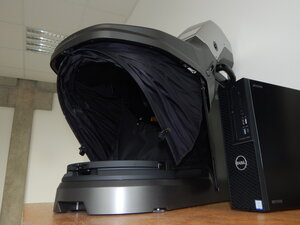
3D coordinate measuring machine (3d scanner)
The optical 3D coordinate measuring machine of the VL series captures complex shapes and geometries of any measured object with the help of fringe projection images. 16 million measuring points enable the determination of form and position tolerances as well as plane, profile, profile comparison and 3D comparison measurements. In addition, the highly accurate acquisition of measured objects in conjunction with the latest software enables CAD data feedback to be performed in order to generate and edit virtual 3D models.
horizontal single-sample dilatometer dil 801
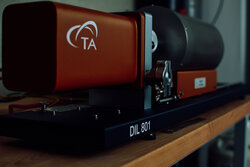
With our fully automatic and highly precise horizontal single-sample dilatometer, a sample can be measured over a temperature range from -90°C to 450°C in a defined atmosphere. The results from the temperature-dependent dimensional changes can be used for quality assurance and basic research for process simulation.
discovery dma 850
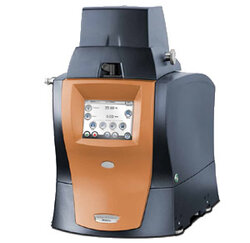
Dynamic mechanical analysis (DMA) can be used to assess the mechanical properties of materials as a function of temperature, time or humidity. By measuring the elastic and viscous properties, complex materials such as polymers and composites can be described for process simulation and, for example, the glass transition temperature of polymers can be determined.
discovery dsc 250
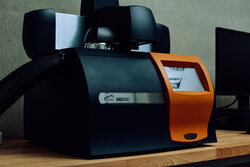
DSC (Differential Scanning Calorimetry) is used to determine the amount of heat generated or released by a sample during heating or cooling. This enables the determination of characteristic material values (e.g. phase transitions, specific hear capacity), especially for filled and unfilled polymers, technical high-performance polymers and fibre-reinforced polymers according to DIN EN ISO 11357-1 to -7. These determined results form the basis for process simulations.
hr-20 discovery hybrid rheometer
The rheometer is used to investigate material-specific deformation and flow behaviour and serves as a basis for process simulation. Flow tests, time-dependent measurements to determine creep behaviour and stress relaxation, but also vibration tests can be carried out. The viscosity and yield point are determined in order to gain a better understanding of the processability of polymers.
dynamic materials testing machine hc 100 kn
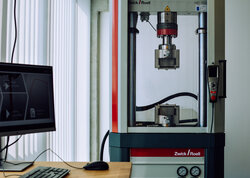 The Dynamic Materials Testing Machine is used to determine characteristic material values, in particular of filled and unfilled polymers and technical high-performance polymers as well as fibre composite polymers. These obtained values are required both as a basis for construction and design tasks (e.g. of lightweight structures and generally as input for simulations) and for the relative evaluation of different materials in the context of material selection.
The Dynamic Materials Testing Machine is used to determine characteristic material values, in particular of filled and unfilled polymers and technical high-performance polymers as well as fibre composite polymers. These obtained values are required both as a basis for construction and design tasks (e.g. of lightweight structures and generally as input for simulations) and for the relative evaluation of different materials in the context of material selection.
WDD- PLANT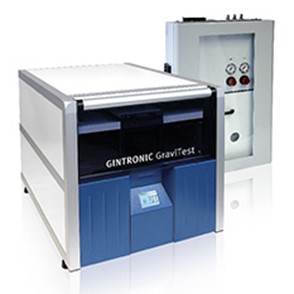
Determination of the water vapour transmission rate of films and foils for samples with a thickness up to 25mm.
Bulk density measurement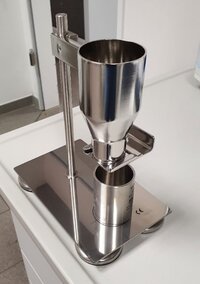
Determination of the apparent density of moulding compounds according to DIN EN ISO60
grinding and polishing machine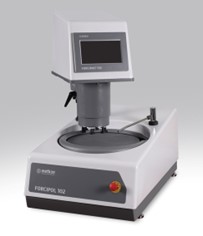
Mechanical processing, from cutting larger components to grinding and polishing samples. grinding and polishing of ground samples.
microscopy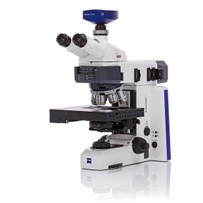
Imaging for fracture analyses, texture analyses and morphology with large-area scans
and extensive evaluation options (e.g. fibre volume content). Combined with
dark field, polariser and comprehensive software, the microscope offers a range of analytical
optical examination, the microscope also offers a range of analysis and evaluation functions.
In addition, the heating/cooling table can be used to investigate the material behaviour during temperature changes (e.g. melting).
(e.g. melting, crystallisation, dissolution and precipitation processes, formation of spherulites)
at cryogenic temperatures up to 600°C can be examined.
3d printer raise3d pro2
Our 3D printer uses the Fused Filament Fabrication (FFF) process. Through integration of sensor technology during the printing process, the functionalisation of 3D printed components can be advanced. Thus, it is possible to derive material-process-property relationships in order to increase the overall performance of additively manufactured components.
mini extruder with film blowing unit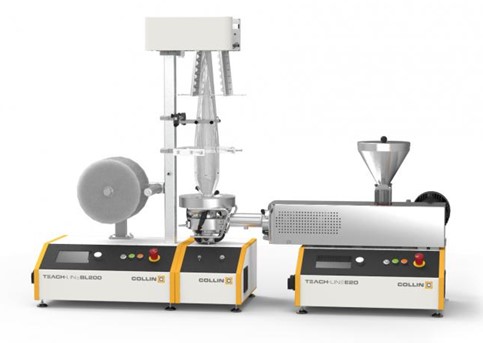
Laboratory production trials for standard plastic pellets up to max. 300°C for strand extrusion and blown film production.
composite processing station with oven and resin/reaction
injection molding/ rim plant
Resin injection plant for the production of fiber composite and pure plastic specimens (shoulder,
short, long samples). Processing of low-pressure injectable resin systems in interaction
with fiber semi-finished products such as woven fabrics and scrims made from a wide variety of fiber materials.
partners
As one of the 14 research and technology DIT campuses, we offer a unique network of combined expertise in various disciplines.
Our highly qualified team works in close co-operation with partners from industry and education to master application-oriented challenges from industry.
 |
thinkTEC 3D GmbH, Grafenau |
 |
IGO3D GmbH, Hannover
Desktop-3D-Drucker und Zubehör |
 |
AZUR SPACE Solar Power GmbH, Heilbronn Weltraum-Photovoltaik |
 |
Johannes Kepler Universität, Linz
|
 |
Karl Bachl GmbH & Co.KG, Röhrnbach Bauindustrie und Kunststofftechnik |
 |
Reimann Industrietechnik GmbH, Hofkirchen-Garham
Metalloberflächenveredler |
 |
DCUBED (Deployables Cubed GmbH), Germering Verteidigung & Raumfahrt |
 |
SUMIDA Components & Modules GmbH , Obernzell
elektronische Bauelemente |
 |
Bayern Innovativ Cluster Neue Werkstoffe |
 |
Technische Universität München
|
 |
Mitglieder des Composites United e. V. (CU) |
 |
DQBD GMBH, |
 |
TecPart- Verband Technische Kunststoff-Produkte e.V., Frankfurt am Main
|
 |
MAINCOR Rohrsysteme GmbH & Co. KG, |
 |
Universität Regensburg
|
JOB OFFERS
We are always looking for experts and ambitious young scientists with an academic background in the fields of polymer technology and simulation of fibre composites as well as in the areas of sustainability and life cycle analysis.
Speculative applications are welcome, especially in the area of process simulation.
currently we are looking for:
You can find current job applications on the University Portal
infos for students
Are you looking for a challenging and exciting job in a technically experienced research laboratory? Then we look forward to getting to know you.
Students from various disciplines can conduct interdisciplinary research and write their thesis at the Hutthurm Technology Campus. As part of the degree programme, we offer various projects and theses in the fields of simulation, sustainability and materials research. Regardless of the topic, our scientific staff will be happy to help you.
We offer students of the Deggendorf Institute of Technology to do research for their final thesis at the Technology Campus Hutthurm and to work on it within the scope of a project. In addition, advertised bachelor and master theses can also be carried out as internships.
You are also welcome to contact us if you are still looking for a company in the region for your industrial internship in the field of polymer technology.
No matter what topic you are interested in - scientific staff is at your disposal.
Current openings (in German):
Student research projects and theses:
Other:
Discover the campus hutthurm in 360 degrees!
directions
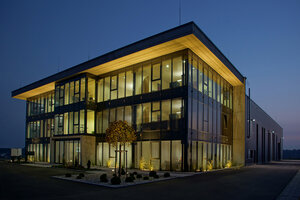 |
Deggendorf Institute of Technology Hochleiten 1 +49 8505 919 879 30 |
